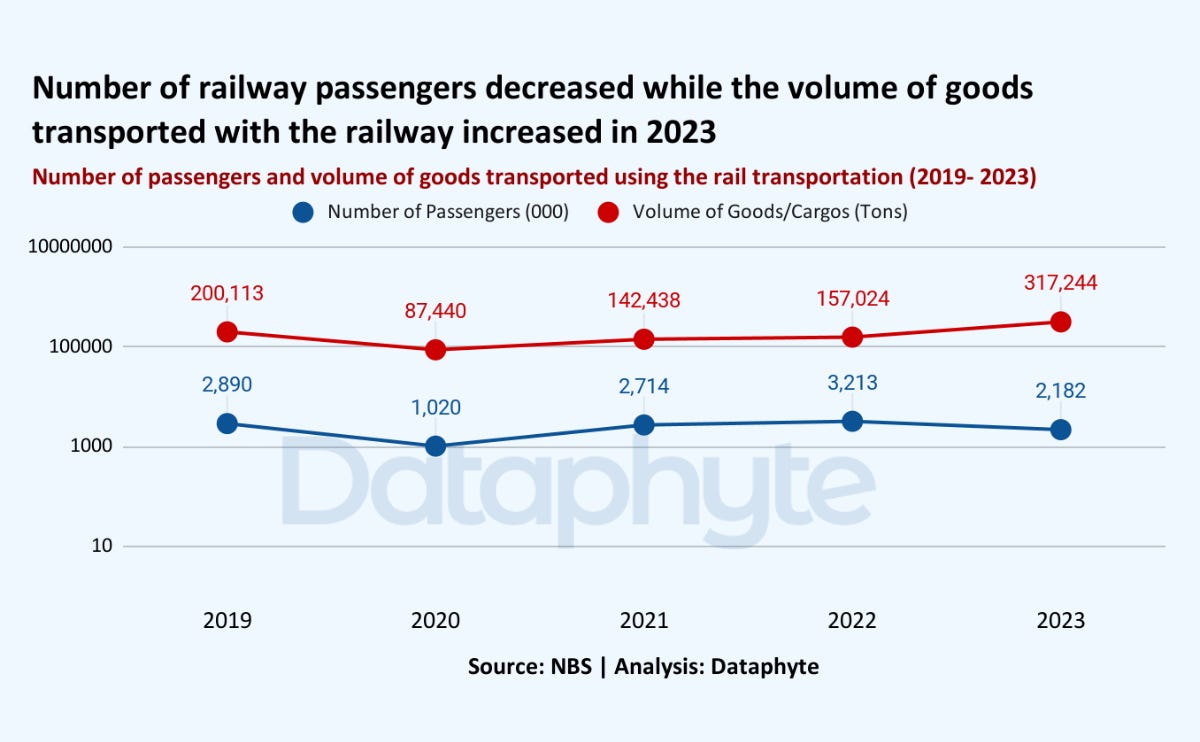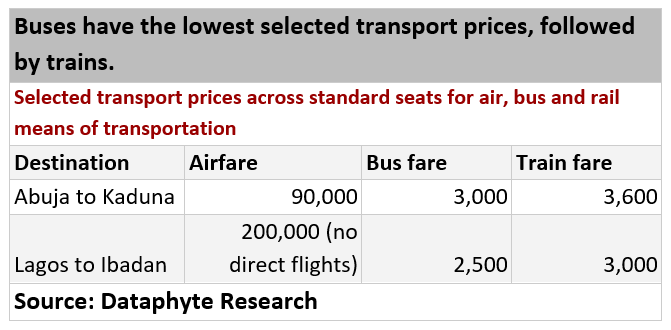Nigerians Favour Rail Transportation for Goods
+Why passengers don’t take advantage of trains?
Nigerians Favour Rail Transportation for Goods
Nigeria's transport sector saw a substantial shift in 2023, with a strong preference for rail transport in the movement of commodities rather than passengers.
Despite this change, the commission’s revenue rose to the highest it has been in the past five years.
This transition, as evidenced by the National Bureau of Statistics (NBS) data on the volume of products moved and income earned, indicates shifting patterns in the country's transportation choices.
This increase in rail transportation highlights a rising trend among businesses and industries in the use of the railway system for the movement of commodities.
However, this trend is also worrying that Nigerians are not using one of the cheapest means of transportation for movement despite the high cost of other forms of transportation due to the rise in the price of petrol.
The NBS data reveals a remarkable increase in the volume of goods transported via rail in 2023, reaching more than double the volume transported in 2022.
On the other hand, the number of passengers who used railway transport fell from 3.21 million in 2022 to 2.18 million in 2023, a decline of over 1 million train passengers.
A dataphyte analysis of PMS price inflation and transport inflation also reveals a strong relationship between fuel prices and transport prices.
According to data from NBS, from January 2023 to January 2024, there is a general upward tendency in PMS and transportation inflation.
This proves there is a relationship between the increase in the price of fuel and a hike in transport fares charged by vehicles that use petrol.
Train passengers are spared these extra costs.
According to Dataphyte's analysis, trains are not the most cost-effective mode of transportation for some routes. Buses had the lowest costs, while planes had the highest fares.
However, the bus fare estimates are for those buses boarded at public parks. The seating arrangements on these buses are not usually as comfortable as that on trains.
So, trains may be cheaper than buses when costs and passenger comfort are considered together.
According to the National Infrastructure Commission in its report titled “The Future of Freight”, rail freight is frequently more cost-effective and efficient for commuting and delivering bulk items over large distances, potentially saving firms money.
Furthermore, trains have a large capacity, allowing for the efficient transportation of heavy or voluminous cargo such as coal, grain, ores, and manufactured products in a single journey.
This efficiency extends to long-distance transportation, where rail transit shines, costing minimal energy per unit of freight while providing environmental benefits.
Another important consideration is reliability, as railways normally follow regular schedules and routes, reducing the hazards associated with traffic congestion or weather-related delays.
Moreover, rail transport is widely regarded as safer than road alternatives, with lower accident rates and reduced susceptibility to theft or cargo damage.
Regulatory considerations also favour rail transport, especially for commodities subject to stringent regulations, such as hazardous materials.
Overall, these attributes collectively position rail transport as a highly advantageous option for moving commodities efficiently and reliably across vast distances.
Why passengers don’t take advantage of trains?
This decline in passenger usage could be attributed to several factors. Firstly, the limited coverage of rail networks may leave passengers unable to access services for their specific travel needs.
Additionally, the allure of cars, buses, and airplanes often overshadows rail due to perceived flexibility, convenience, and speed.
Passengers might also be discouraged by discomfort and lack of amenities onboard trains, especially if carriages are outdated or poorly maintained.
Cultural preferences for private transportation, alongside ageing infrastructure and technology, further,, contribute to this negative perception of rail transportation.
Should the Nigerian Railway Service be worried?
The NBS data has proved that the Nigerian railway service should not be worried about the decline in passengers.
The trend from the revenue generated by the Nigerian railway corporation shows that the corporation has generated more revenue in 2023, more than it has in the last five years.
This revenue comes from transporting commodities mainly.
However, on the part of the commission, addressing these obstacles necessitates significant investment in infrastructure, enhancing service reliability and quality, improving onboard comfort and amenities, competitive pricing strategies, and seamless integration with other transportation modes to offer passengers a compelling alternative.
Where the Nigerian Consumer comes in
On the part of consumers, it might seem like there is an underutilization of the best and most economical transportation options.
Despite rail transportation being one of the cheapest forms available, a lack of data on rail transport fare watch makes it challenging to assess its affordability compared to other modes.
Nonetheless, a quick survey by Dataphyte comparing train and bus prices reveals minimal differences. Considering factors like ease, security, and speed of rail transport emerges as the most favourable option.
Therefore, encouraging consumers to embrace rail travel could lead to more efficient and cost-effective transportation choices.
This edition of Pocket Science was written by Khadijat Kareem, who enjoys cheap thrills and edited by Oluseyi Olufemi, who likes comfort even if he has to pay more to have it.
Thanks for reading. See you next week.









